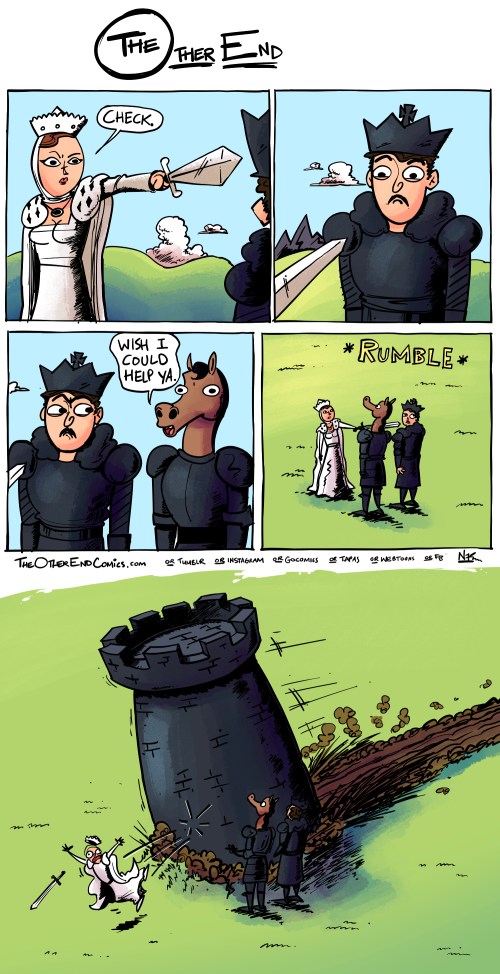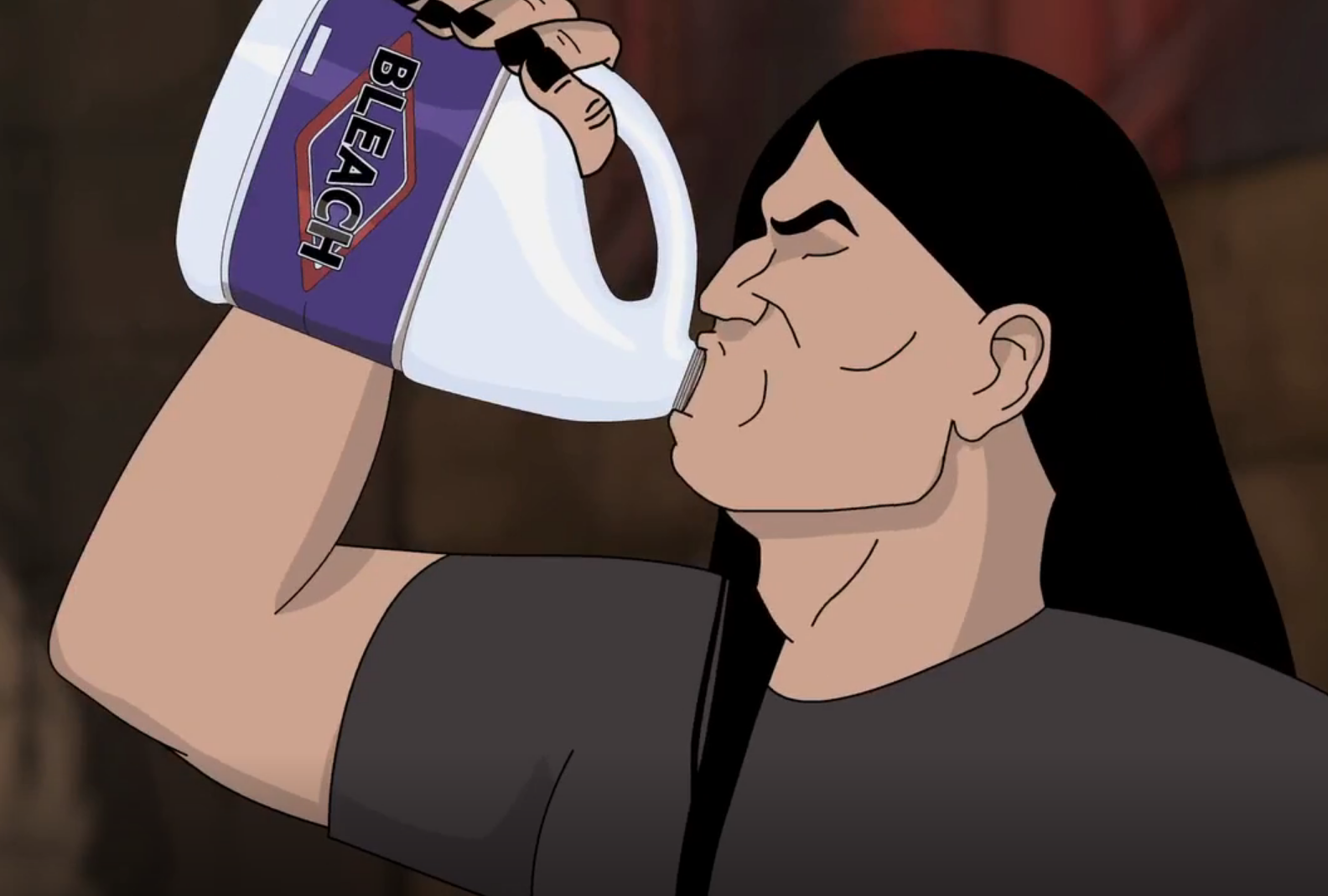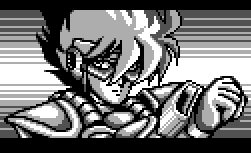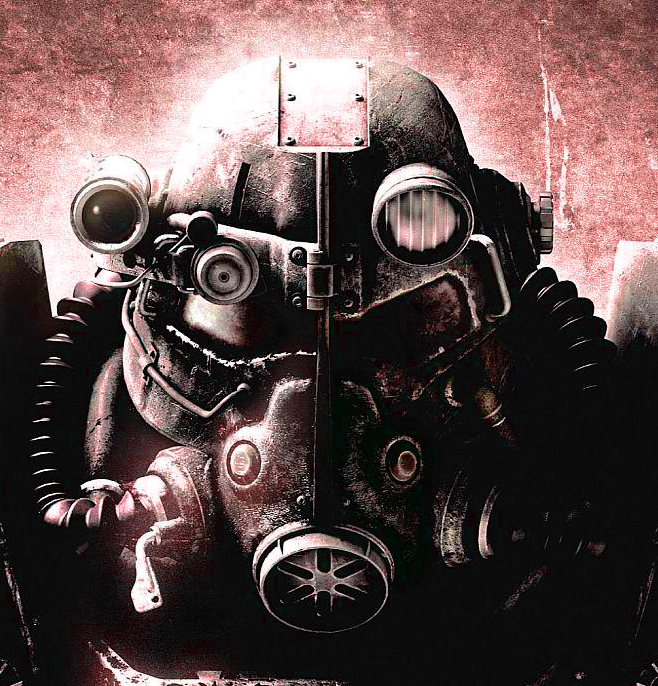Source unknown, some sites assign it to Oppressive Silence comics by Ethan Vincent. But that website in the corner is shady

I don’t get it
Queen moves into a space that stops king from moving as you cannot move into a check. It’s a forced draw.
What’s the benefit to the game of this being a draw instead of an obvious loss to white?
“You didn’t win correctly.” - Chess (The original Dark Souls-themed tactical grid-based roguelike war game)
They’ll fix it in chess 2.
Or in one of the paid dlcs.
Na the last patch to chess was 400 years ago. I don’t think it is being actively developed anymore.
David Sirlin actually made chess 2 years ago, you can go try out its different armies
Stalemate rules mean that a player in a heavily disadvantaged position still has the opportunity to play for a draw, whether that comes from their own clever play or a mistake from their opponent (what happened in the comic).
Depends.
If the goal is to just play a game with a clear winner and loser, there’s no benefit at all.
But that isn’t what chess is. It’s more like a strategy game where there are multiple outcomes that would reflect degrees of skill and thinking.
If you’re already behind, but you can pull off a stalemate, that’s hard. In some ways, it’s harder than winning in the first place. It means that you and the other player are well matched. I’ve heard serious players rattle on about difficult draws the way football (both types) fans will talk about decisive victories of their favorite team. They’ll pick the moves apart and use those moves and tactics in their own games.
I was never a serious chess player at all. I simply don’t have the willingness to study it the way you have to to be really good at it. It felt too derivative for my preferences. But I can still remember more of my close games and draws than I can my wins because it took more of the kind of gameplay I enjoy, where you’re kinda winging it and calculating based on your own way of thinking instead of relying on a body of research and theory.
Mind you, there’s nothing wrong with that at all. The folks that play high level chess are amazing, and I fully respect the work they put into grokking chess at that level. I’m just saying that isn’t fun for me, and I play board games of any type for fun and companionship, not personal improvement or a sense of competitiveness.
Which, going back, is why I can recall my draws better than my wins or losses. They were me having fun and managing to hang with smarter, better players by dint of sinking into the play of it.
But when one of those players pulls off a draw from disadvantage? That’s fucking art, it’s mastery of a complicated but finite set of possibilities.
Thanks for the word grokking.
You and Elon can compare notes about how much you love the idea.
?
In a competitive setting, it would mean that both players get 0.5 points instead of white getting 0 and black getting 1 points.
It forces players to focus on the game no matter how much of an advantage they have.
I don’t know anything about chess but I imagine one benefit would be to give the losing player one last opportunity to avoid a loss by being strategic and give the winning player the need to still think about their moves instead of just randomly moving around since they know they will win otherwise.
In theory black could play poorly and give the queen away by placing it next to the white king, then if the white king takes the black queen it would be a draw. Why would black do such a thing? Well playing poorly also means stalemating your opponent in an obviously winning position, which also happened here.
You can argue it’s an “obvious win”, just like I could argue if I’m a piece up it’s an “obvious win” for me. But just because it’s obvious doesn’t mean the result is guaranteed to happen.
Also I guarantee you not everyone can actually checkmate a king with just a queen and king. So in fact it’s not so obvious for a super beginner.
As for the benefits of the actual mechanism itself, in some positions you can actually force a draw or stalemate where you’d either otherwise be losing, or you are unclear of your advantage. For example in one of my games I was chasing the King around with my Rook where if the king took my rook, it would be stalemate, and if they didn’t take my rook I would keep checking the king (while making sure the distance between my rook and their king is 0).
I appreciate all of these super in depth responses, but man does it validate my decision to never invest any time into chess lmao.
Well as with everything, there is the surface level and the deep rabbit hole. We have only ventured a bit in the rabbit hole. I think enjoyment of chess at any level is possible, but it is definitely not for everyone.
It’s just very amusing from the outside to observe a fervent and dedicated community insisting a thousands of years old game’s wonky design choices make sense for a dozen different reasons. Gamers really never change.
I’m not defending the design choice perse, just giving you the things needed to be considered that goes into making such designs.
Never liked that rule. The king should be a capturable piece and be allowed to step into checks. It might make the game harder at a beginner level but it gets rid of the anticlimactic stalemates. It won’t get rid of draws because the repetition rule still applies.
Well that’s a fair argument. But I see it as a clever balancing rule.
Technically, if we get rid of the stalemate rule it makes the game harder for the defending (losing) side because it 1. removes an extra defensive resource and 2. forces the defending side to calculate an extra threat.
Now if we think about a theoretical perfect game, black always has a slight disadvantage due to going second. Therefore, in this theoretical game black would always be on the defending (losing) side. If we remove that extra defensive resource black has, which is a stalemate position then white gains an even bigger advantage against black before the game even starts. So in theory if one day chess is solved white might actually win every game.
Of course that’s more of a conjecture on the extreme end but the point is that the stalemate rule is an extra defensive resource that aims to further the hopes of equality for black in my opinion.
In Chinese variant of chess, the king (general) can be forced to step into check thus resulting in losing the game. But most games just stop there when the king has no “legal move” and yield.
Because not all positions are winnable and chess is more about records rather than 1 win or loss. For example 1 person beating another person 1 time is meaningless. 10-3-2 record means something else entirely.
This + no other piece is allowed to move
Huh? I thought having no valid moves that wouldn’t lead to the king’s death was a loss. How DO you lose then?
That would be the case if the king was currently in check, but as he’s currently on a safe space then it’s stalemate
Have to put him in check, while also preventing him from moving into another spot that could also put him into check.
This would likely have been a stalemate anyway.
Edit: the bishop’s existence didn’t even register to me when I made this comment. More pieces are better, and yes, King and Queen are sufficient to mate. However, the fewer the pieces you have, the lower your chances of success.
King and queen is fully sufficient to checkmate
I said likely. I know it’s sufficient, but it’s not inevitable.
It is inevitable, there’s no maybe about it
It’s possible to stalemate, too.
It’s been a long time since I played, but king+queen+bishop should be pretty achievable?
It is, king and queen is all you need
This would likely have been a stalemate anyway.
How come? I’m not very good at chess personally but I was under the impression that queen-bishop-king was generally sufficient to force a mate.
Somehow I didn’t even register the existence of the bishop. It’s possible to mate with just king and queen, but more pieces the better.
deleted by creator
How is it a draw is both black bishop and king are still playing? Queen moves back, white king moves anywhere it wants and for good sake do a proper check mate
An I over analysing?
How can the queen move back when it’s the white king’s turn and he can’t move
Under analyzing.
It’s black move for the queen, the next turn is white and the king is blocked but not in check
Wrong move, stalemate (white has no legal moves). White gets off with a draw.

This comic is indeed by oppressive silence comics by Ethan Vincent.
He seems to have disappeared from the internet in mid-2018. This comic titled draw seems to have been his second to last published comic.Archived link to his website.
xcancel link to his twitter.Is this some special rule? Looks like check mate to me?
It’s a stalemate
It’s only checkmate if he’s currently in check and has no legal moves afaik.
The queen can’t take the king from that position, so he’s not in check, so it’s not check mate.
I suck at chess so badly.
I castle my king because I think castling is cool.
https://www.tiktok.com/t/ZT2rHcqYr/
silly chess educational tiktok to ummm not have this happen.
I’ve never understood why stalemate is draw.
Not in check = not in danger
I understand the reasoning, not the legitimacy.
The legitimacy was described above. The game is designed so that you can’t stop focusing even when you’re in a winning position. Players over the centuries have admired cleverness in the face of overwhelming odds. That’s what it means to turn a losing position into a draw.
For real life war analogies, think of the king escaping through a secret tunnel while his castle is under siege and all his soldiers dying.
The extra challenge stalemate adds can be interesting, I don’t deny it.
It’s just that if a player is in a position where they can’t do anything beside suiciding their king, they’re obviously not winning, and it seems a little bit unfair for the other player to consider the situation is equal and that noone can be designated as the winner.
I’m not sure why it should be considered unfair for a player with a winning position to allow his opponent to escape with a draw by stalemate due to the winning player’s carelessness.
The position where you have a king, queen, and bishop versus a king is totally winning and all it takes is patience and careful moves to win. The only way the lone king is getting a stalemate is due to carelessness on the part of his opponent.
I’ve never understood why you never understood why stalemate is a draw.
Chess is an old game, and stalemate wasn’t always considered a draw. At other times, creating a stalemate may have been considered a win or loss or partial win, or it may have been illegal altogether. But the modern draw makes sense if you keep in mind a few things. First, the victory condition is putting the opponent’s king in checkmate (or accepting their concession). Second, exposing your king to an attack during your move is not just a blunder, it is actually an illegal move, to the point that you can’t even do it as a pass through while castling. So stalemate is a unique outcome where neither player achieves their victory condition, yet the game cannot continue, since the player who must move next has no legal moves available.
In a practical sense, stalemate offers a means of giving a player in an inferior position a means of escaping a loss by punishing the dominant player for not being able to capitalize on their lead. It helps prevent someone from being able to brute force a win by making safe moves that do little to actually progress the game, like advancing all their pawns until the game is trivial. It’s much less interesting to have the end game strategy be more about not losing one’s lead rather than extending it.
So a win requires being more than slightly ahead of an opponent. It’s worth pointing out that most high level chess games end in a draw where neither player has a sufficient lead to force a checkmate. There are other rules in modern chess that also force a draw to make sure the game is more about getting a win than just avoiding a loss. Otherwise there would be plenty of ways someone could stall forever to try to get their opponent to concede, and that’s not very interesting.
because there are situations where you do have moves left, but the end in a repeating pattern; the more “classic” stalemate condition.
there’s just no “special” case for when you have no legal moves, thus it defaults to stalemate














